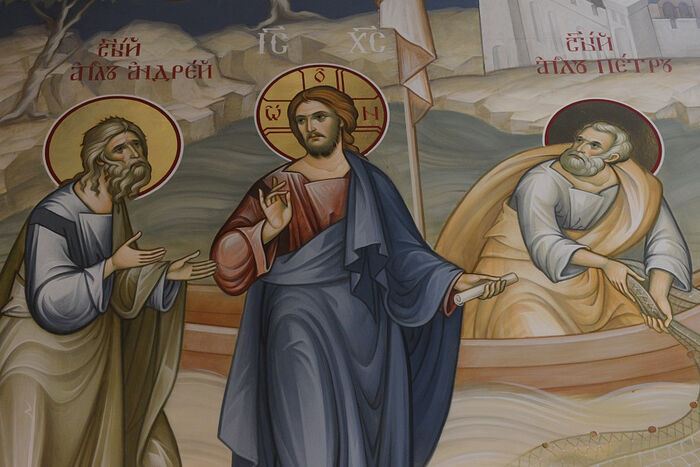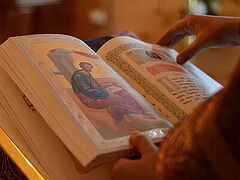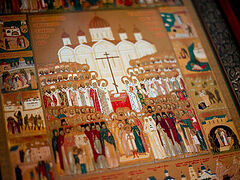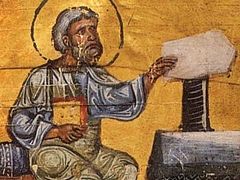There is a clear logic to the feasts and commemorations of the Church during this time of year. Celebrating the descent of the Holy Spirit at Pentecost is followed by the Sunday of All Saints, for all who fulfill the basic human vocation to become like God in holiness do so by the transforming power of the Holy Spirit within their hearts. Pentecost and All Saints remind us that holiness is not a calling for a select few, but the vocation of all who bear the divine image as unique, irreplaceable persons loved by God.
During the Apostles Fast, we prepare for the celebration of the feast of Saints Peter and Paul, who are shining examples of what it means to find healing for our souls such that we shine with the radiance of the divine glory. Both men had sinned greatly, with Peter denying the Lord three times and Paul having fiercely persecuted Christians. Nonetheless, the Lord called, healed, and strengthened them to the point that they became foundational pillars of the Church.
We may want to let ourselves off the hook of the calling to follow their example due to a misplaced sense of humility. We may think ourselves unworthy of hearing the Savior’s call to the first disciples: “Follow Me, and I will make you fishers of men.” Of course, we would suffer from grandiose delusions and spiritual pride if we were to seek their prominence or position in the Church. The Lord does not need us to play their particular roles, of course, for they have already fulfilled them. All the apostles, including Sts. Peter and Paul, learned through their difficult journeys that responding faithfully to God’s calling in their lives was not a matter of self-glorification. Instead, theirs were paths of humility in which their sins were made clear for them and others to see. They both made the ultimate witness as martyrs, becoming last in this world to the point of shedding their own blood for Christ. They pursued paths that had nothing to do with self-exaltation. As St. Paul wrote, “God has displayed us, the apostles, last, as men condemned to death; for we have been made a spectacle to the world, both to angels and to men… To the present hour we both hunger and thirst, and we are poorly clothed, and beaten, and homeless. And we labor, working with our own hands. Being reviled, we bless; being persecuted, we endure; being defamed, we entreat. We have been made as the filth of the world, the offscouring of all things until now.” (1 Cor: 4: 9-13)
To hear and obey the Lord’s calling to “Follow Me” is not to raise ourselves up by our own piety, legalism, or morality. It is not to assume that we are somehow God’s favorites or to engage in any kind of religious triumphalism. As St. Paul wrote in today’s epistle reading, “glory and honor and peace to everyone who does good, to the Jew first, and also to the Greek; for there is no respect of persons with God.” He wrote of the Gentiles “that what the Law requires is written on their hearts, while their conscience also bears witness, and their conflicting thoughts accuse or perhaps excuse them on that day when, according to my gospel, God judges the secrets of men by Christ Jesus.” The pressing question is not how much of God’s truth we have received, but how we have responded to what has been revealed to us. As St. Paul said, “it is not the hearers of the Law who are righteous before God, but the doers of the Law who will be justified.”
As living members of Christ’s Body, the Church, we have received the Holy Spirit personally in Chrismation and are nourished by the Savior’s Body and Blood in the Eucharist. The Savior has called and empowered us to live each day of our lives as those who participate by grace in the life of the Holy Trinity. To recognize these truths in humility means to know immediately how unworthy we are of such blessings and how far short we fall of the calling to live accordingly. When we recall the Lord’s teaching that “to whom much is given, much will be required,” we should fall on our faces in repentance because of the great responsibility that is ours. (Lk 12:48) The Savior said, “Not everyone who says to Me, ‘Lord, Lord,’ shall enter the kingdom of heaven, but he who does the will of My Father in heaven.” (Matt. 7:21) He also said, “If you love me, you will keep my commandments.” (Jn. 14:15) As the Lord told His disciples, “Unless your righteousness exceeds that of the scribes and Pharisees, you will never enter the kingdom of heaven.” (Matt. 5: 20) Struggling to obey the Lord each day is the only way to grow in holiness and follow the path of the saints to the heavenly kingdom. To identify ourselves with Christ without pursuing this difficult and humbling path is sheer hypocrisy in which we judge ourselves by the contradiction between our words and our deeds. We will never become “fishers of men” by entangling ourselves in the nets of such spiritual pride and delusion. Instead of attracting others to Christ like a beacon in the darkness, we will turn them away by our bad example. There are far too many examples of people who do precisely that in the world today.
We must also remember that we will never become “fishers of men” merely by our own efforts at piety. St. Seraphim of Sarov taught, “Acquire the Spirit of peace and a thousand souls around you will be saved.” The Spirit of peace is, of course, the Holy Spirit, through whom we have become children and heirs of God through Christ. (Gal. 4:6-7) St. Seraphim also taught that “the true aim of our Christian life consists of the acquisition of the Holy Spirit of God.” Along with conveying many other deep truths, his statement entails that it is impossible for anyone to fulfill the basic human vocation to become like God in holiness apart from embracing the healing, transformative presence of the Holy Spirit in their lives. If we do not do that, we will lack the spiritual strength to bear witness to His restoration of the human person in the divine image and likeness. We will then be unable to become the kind of people who draw others into the nets of the Kingdom of Heaven.
The only way to find the healing of our souls is to become like the apostles who first responded faithfully to Christ’s command, “Follow Me.” The light yoke of the Apostles Fast gives us an opportunity to humble ourselves before the Savior in prayer, fasting, and almsgiving in order to gain the spiritual strength to turn away from the weakness of slavery to our self-centered desires so that we will become more fully the uniquely beautiful persons our Lord created us to be. By humbly offering even the darkest and more corrupt dimensions of our lives to Him for healing, we will find liberation from the nets that hold us back from entering into the joy of eternal life as both a present reality and a future hope.
When the disciples first heard Christ say “Follow Me,” they were doing their daily work as fishermen. Let us not think that His calling is esoteric or removed from the mundane realities of life. We have no lack of opportunities to answer His call in our families, workplaces, friendships, and neighborhoods, as well as in this small parish. No one else is married to your spouse, is the father or mother of your children, or is the particular friend, worker, or parishioner that you are. No one else has the vocation to serve Christ in those around you in the unique way that you do. The present circumstances of our lives present limitless opportunities to become fully receptive to the presence and peace of Holy Spirit. None of us lacks anything necessary to grow in holiness, obey Christ’s calling, and draw others into the life of the Kingdom. In other words, we have everything that we need to follow in the path of the apostles and saints in humbly obeying our Lord. That is how we can become radiant with the divine glory and obey the Savior’s calling: “Follow Me.”




